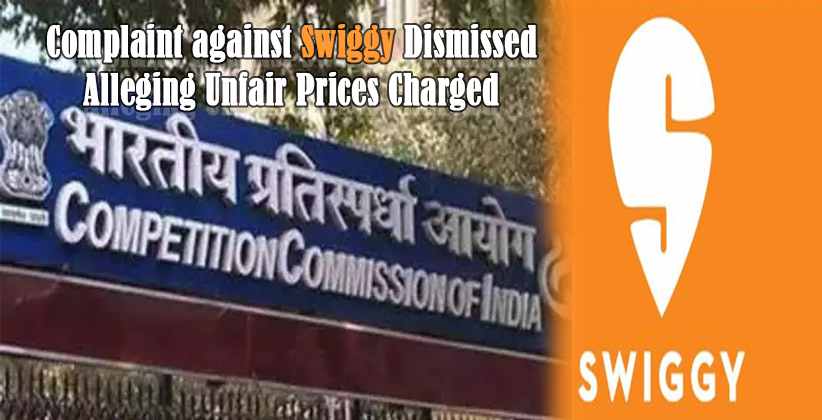The Competition Commission of India disposed of a complaint filed against the online food delivery giant Swiggy that alleged that the company charges unfair prices from its customers. It was filed by advocates Prachi Agrawal and Tushar Sharma under Section 19(1) (a) of the Competition Act, 2002 against Bundl Technologies Pvt. Ltd. (a.k.a. Swiggy) alleging a contravention of Section 4 of the Act.
Relying on the reports of various data intelligence platforms, the informants stated that Swiggy tops the market share, and its website also claims it to be the leading food ordering and delivery platform in India.
The complainants alleged that the rates charged by the company for its services are much higher than the rates offered by the respective restaurants in offline delivery mechanisms. According to the informants, Swiggy charges a commission on the total bill amount, which is inclusive of GST, from its partner restaurants. Also, it charges from its customers a delivery fee which ranges from Rs 20 to 100 and can be even more in times of high demand, special occasions, and rains and on midnight deliveries.
The informants also stated that the customers are unaware of the offline prices offered at the restaurant, and hence are rendered incapable of comparing the two. The customers are blinded and made to believe that only delivery charges are applicable and are completely unaware of the inflated prices of the OP which are unreasonable and varyingly apply to various dishes, the order read. In addition to this, the informants prayed to the Commission to impose an appropriate penalty on Swiggy for charging unreasonable and unfair prices from customers (which is in contravention of Section 4(2)(a) of the Act) and direct Swiggy to discontinue such abuse of dominant position.
Denying all allegations put up against it, Swiggy submitted that it only operates as an intermediary (as defined in Section 79 of the IT Act, 2000) and the prices displayed on the platform are directly uploaded by its partner restaurants, as the decision on pricing solely rests with the partners and Swiggy has no role (direct or indirect) to influence the prices on its platform.
It also averred that when it receives complaints from buyers who find discrepancies between the prices listed on the platform and the partners menus, the same are escalated to the partners or action as Swiggy cannot control, alter or affect the prices of items listed on its platform.
The Commission observed that the company has entered into a contractual agreement with its various restaurant partners that seeks them to maintain a uniform price of food items sold by such partners when dealing with them directly or through the online platform of Swiggy. This indicates that allegations against Swiggy do not appear to be substantiated in the present case, the order read.
The Commission observed that it would be apposite for Swiggy to give sufficient disclosures on its platform that it is not involved in the fixation of price of the products/menus of the restaurants on its platform, so as to alley misgivings, if any, in the minds of any stakeholder including the consumers.
The Commission held that it found no prima facie case of contravention of the provisions of Section 4 of the Act.








